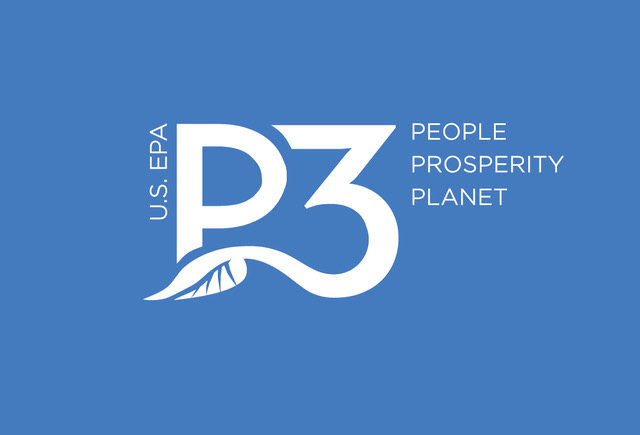Three Student Teams Advance to National EPA Competition

November 16, 2021
West Lafayette, IN—Let’s work to improve quality of life for people, promote prosperity by developing local economies and protect the planet by conserving resources and minimizing pollution. This is the goal of the Environmental Protection Agency’s “P3 Student Design Contest.” This year, with the help of Purdue’s Center for the Environment, the Office of Undergraduate Research and affiliated faculty from the College of Engineering and the Purdue Polytechnic Institute, three student teams have advanced to the national competition.
This annual competition is open to teams of undergraduate and/or graduate students and provides up to $25,000 per university for the team who presents the best proof-of-concept design solution. The winner must submit an idea for a multi-year project that addresses a sustainability challenge in one of four broad research areas: Improvement of Air Quality; Clean and Safe Water; Chemical Safety; or Sustainable and Healthy Communities. Successful teams then have the ability to compete for up to $100,000 to scale up their innovations. Only one team per university can receive an award.
In recent years, several Center affiliates have sponsored winning projects on topics ranging from the recycling of LCD screens (Fu Zhao, Mechanical Eng., EEE; Carol Handwerker, Materials Engineering), to development of sustainable hydropower systems (Klein Ileleji, ABE), hydraulic pumps in Haiti (Bernie Engel, ABE) to the project that garnered the $100,000 prize, the creation of a biowall for improved air quality (Bill Hutzel, MET).
This year, the Center for the Environment helped develop teams by promoting the contest to faculty and students, providing information sessions, leading workshop development opportunities, and by giving $300 of support to each team that successfully submitted their proposal.
Three student teams developed innovative design projects:
DIY Biowall for NASA Microgravity Research (Bill Hutzel, MET): The goal of this project is to create an efficient, scalable biofiltration device that can be applied both in households and in microgravity environments such as the International Space Station, the moon, or even Mars. This solution can be scaled down for educational use within schools to educate students about the important issue of indoor air quality. The device will be made of sustainable materials.
Undergraduate Student team, Mechanical Engineering Technology: Thomas Accardo, Zhengdao Chen, Benjamin Sierzputowski
Graduate Student Member, Mechanical Engineering Technology: Dhanurja De Silva
Wave-Powered Batch Reverse Osmosis Incorporating Salinity Gradients (David Warsinger, Mechanical Engineering): The project goals include modeling a reverse osmosis desalination system, building a prototype to validate the model, and analyzing the financial feasibility and environmental effects of an up-scaled system. To achieve this, the team will be work with communities impacted by water scarcity. To inspire a mindset of environmental stewardship, the project will include a short-term project-based curriculum that can be adopted by elementary schools to teach water sustainability.
Undergraduate Student team, Mechanical Engineering: Adriana Hisham, Alondra Ramos, Cole Heald, Kaitlin Kelsey, Ryan Soltis, Vivek Singh; Environmental and Ecological Engineering: Aaron Harp; Chemical Engineering: Carolina Bernal.
Cost-Effective Techniques for the Monitoring & Reduction of Indoor Air Pollutant Exposures in Classroom Environments: Overall project goal is to apply the Purdue EPICS engineering design process to design, evaluate, and implement an affordable, practical, and non-invasive indoor air pollutant exposure mitigation solution based on a portable air filtration device. The team will utilize low-cost, cloud-based air quality sensors for real-time monitoring of indoor air pollutant concentrations in classrooms and analyze indoor air pollutant source and loss processes. The team will also develop educational and informational modules and classroom activities on indoor air quality and air filtration.
Undergraduate Student Team: Mia J. Gilbert, Arsh Bhatia, Aayush Mathur, Avalin N. Senefeld, Matthew A. Erlichson, Prathit Sanjay, Briley Bowerman, Ryan W. Song, Nathaniel L. Turner, Kishore Natchiappan, Abigail R. Pati, Paige E. Deno, Riya D. Raj, Morgan E. Lehmkuhl, Essence A. Ditmer
Graduate Student TA: Danielle N. Wagner
Though the teams have already begun working on their projects, they will find out if they will receive funding from EPA early in 2022. More information on the contest and Center support is available at their website.
For more information, contact: Lynne Dahmen, Managing Director, Center for the Environment ldahmen@purdue.edu.
About Purdue’s Center for the Environment: The Center for the Environment promotes proactive, interdisciplinary research, learning, and engagement that addresses important environmental challenges. The Center connects the faculty and students across departments and disciplines who work on environmental challenges by actively supporting the development and implementation of innovative projects and teams
